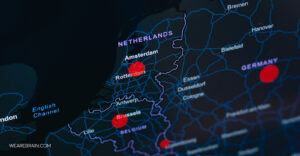Why Ukraine is considered the Silicon Valley of Europe

Ever since Silicon Valley emerged as the centre of the technology world, others have tried to follow its lead. No one has usurped the San Francisco scene just yet, but thriving technology startup hubs have been developed around the world to get themselves in on the action.
Mostly all tech hubs have certain things in common which make them successful for a number of things. For example, most have well-respected tertiary and technical institutions churning out highly capable and adaptable young technology talent. They are also supportive environments which promote an active subculture of art galleries, music scenes and cafes.
And we’re here to tell you the technology industry in Ukraine has these things in abundance. It is already a thriving and well-respected outsourcing centre. Upwork, the world’s leading online freelance site, ranks Ukraine as the third best place in the world to find people with advanced tech and IT skills. Ukraine’s Kiev is considered by many to be a fun place, with a thriving culture that is supportive and inviting.
According to IT Ukraine, a trade association for a number of valued IT companies in Ukraine, the tech sector was the third most pivotal in the country last year, with national export volumes worth over 3.2 billion US dollars. Over 100 R&D centres of major global companies are located in Ukraine. There are 13 Ukrainian companies on the 2017 IAOP Top 100 list of the best outsourcing providers. And Ukraine is a key destination for outsourcing with 170,000 skilled IT specialists whose number one area of specialisation is software engineering.
Seedstar’s director of business development Igor Ovcharenko says the number of IT-powered jobs in the country is likely to increase dramatically in the next five years. “The economy of our country has been shaken heavily in the past couple of years, but IT has always been one of the most stable industries, which makes it super attractive for global technology companies. The salaries are way higher than average in the market, which drives more interest to the industry.”
Ukraine hosts tens of thousands of workers outsourced from Silicon Valley firms like Google and Oracle. “We have 100 thousand developers and IT-related people officially working for outsourcing companies in Ukraine,” Ovcharenko explained, “but you can easily triple that amount with freelancers and those who are not officially registered.”
Mike Buryk insists that “even with robust growth in the domestic IT industry, young Ukrainian millennial tech entrepreneurs are starting to go in a new direction to launch their own companies with global ambitions. In increasing numbers, these innovators are becoming digital nomads. Most of their companies maintain R&D operations in Ukraine while establishing a marketing and sales presence in other more established parts of the tech world, namely Silicon Valley, New York and Amsterdam”.
Ukrainian tech startups offer products and services in a wide variety of industries. Home energy management, cybersecurity, the IoT of pets, construction of autonomous smart houses, agtech, health care, transportation, wearable technology and speech recognition. Whatever the need in tech is, Ukrainian millennials are developing new products that will push the boundaries of existing market niches while defining new ones, according to Buryk.
PwC has rated Ukraine 5th among top 25 global service countries, and one of the primary reasons enterprise companies are attracted to Ukraine is not only the high calibre of resources available, but it’s also the price. It is therefore understandable why giant tech companies like Samsung, Netcracker, War Gaming, Sitecore, SimCorp, Magento, ABBYY, Aricent and SysIQ have been running their R&D in Ukraine for many years now.
Ukrainian startups are on the rise too. Grammarly is probably the best known Ukrainian tech enterprise export among many others. In addition, mobile imaging and AR company Lookersy was sold in 2015 to Snapchat for $150 million, and analytics startup Viewdle was absorbed by Google for over $30 million. Despite the bad wrap, its economic and political woes have given it, Ukraine has a strong technology culture. WhatsApp’s founder is Ukrainian, as is PayPal co-founder and the co-inventor of Wi-Fi. And most famously, Apple’s co-founder Steve Wozniak has proud Ukrainian heritage.
But cementing Ukraine’s new title as the Silicon Valley of Europe will require a lot more money being invested not only in Ukraine but the entire region as well. Funding is an ever-present problem in Ukraine and surrounds. Investment companies and venture capitalists will need to come to Ukraine and channel funds into the tech scene in order to ensure its growth and reputation for being fertile land for tomorrow’s European IT infrastructure.
WeAreBrain has offices in both Kiev and Kramatorsk which employ some of the brightest minds the Ukrainian tech and IT community has to offer. We proudly employ over 60 Ukrainian citizens. We have worked tirelessly on our own contributions to the country’s startup scene with highly successful projects such as Maxperience — a knowledge-based sharing platform, Tur.ai — an RPA business automation platform and clevergig — a SaaS platform facilitating shift planning of flex workers in the gig economy.
We support, encourage and nurture the fresh talents emerging from the many amazing tech learning institutions Ukraine has to offer and prove them with opportunities to work on some diverse global projects. Ukraine and its wonderful people are close to our hearts at WeAreBrain and we are encouraged to see the world’s biggest players in the industry beginning to identify the true worth of its talented people in the global technology scene.
Mario Grunitz
Working Machines
An executive’s guide to AI and Intelligent Automation. Working Machines takes a look at how the renewed vigour for the development of Artificial Intelligence and Intelligent Automation technology has begun to change how businesses operate.







